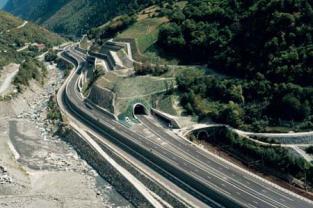The A43 motorway was designed to blend into the Arc en Maurienne valley. Its route was adapted to a steep and narrow mountainous relief, as well as complex geology, in a rocky site (scree and alluviums). It crosses existing roads and hydraulic structures. The engineers had to cope with major issues to stabilise the structures located on sites at limit equilibrium, and to improve the environmental aspect of the valley.
The detailed design and works started in 1984. The motorway was commissioned from 1997 to 2001, and inspection monitoring was performed during the next 5 years for about thirty structures and sensitive slopes. These structures were subject to adaptations during construction, then a few years after commissioning.
The injections performed in the up-line tunnel in the Sorderettes sector caused a landslide to occur above the top of the bedrock.
The following decisions were made to temporarily stabilise the sliding:
- stop injections permanently,
- perform additional draining using 80 m ascending drillings, reaching the tunnel,
- use nailing to consolidate masonry retaining structures and destabilised slopes on both sides of the shaft access,
- reinforce immediate retaining of the tunnel using an umbrella vault with 8m long self-drilling bolts spaced by 0.50 m.
The length of active anchors of large retaining structures was adjusted systematically according to drilling parameters to adapt to the actual position of the rock top level, and to the presence of open fractures, coal seams, mylonite, etc.
Terrasol’s achievements:
- Project management mission up to motorway commissioning.
- Definition of a program of inspections, alarm thresholds, maintenance procedures and reinforcement of structures.
- Inspections monitoring of about thirty sensitive structures and slopes over 5 years after commissioning.
 Agent Access
Agent Access 




